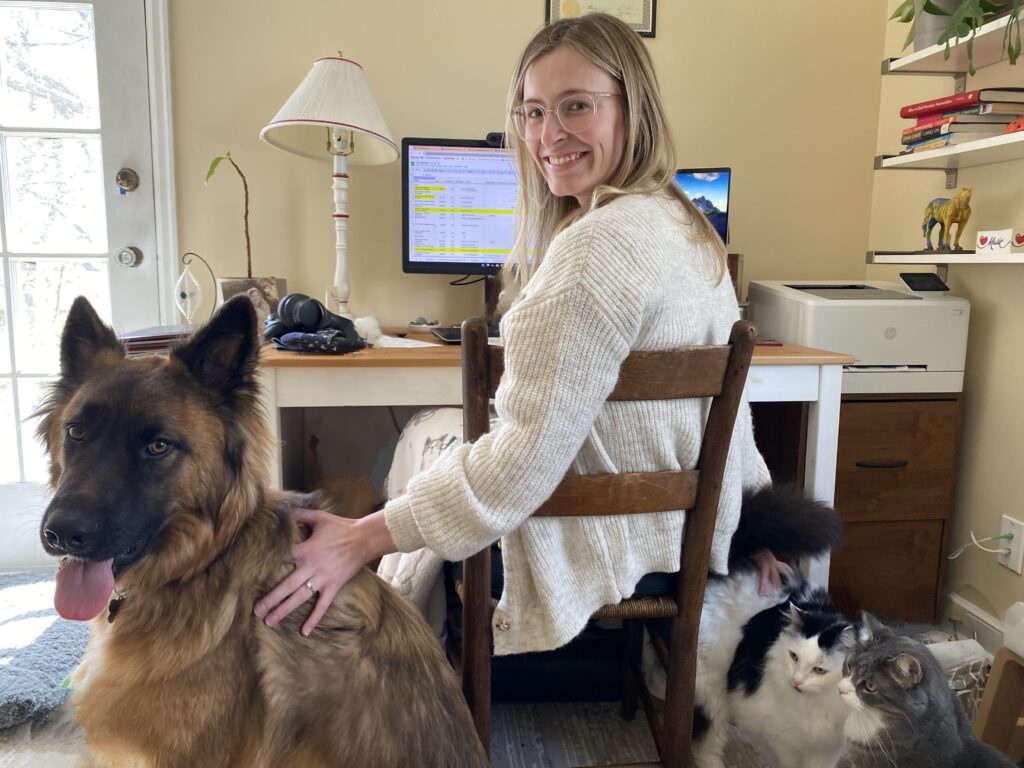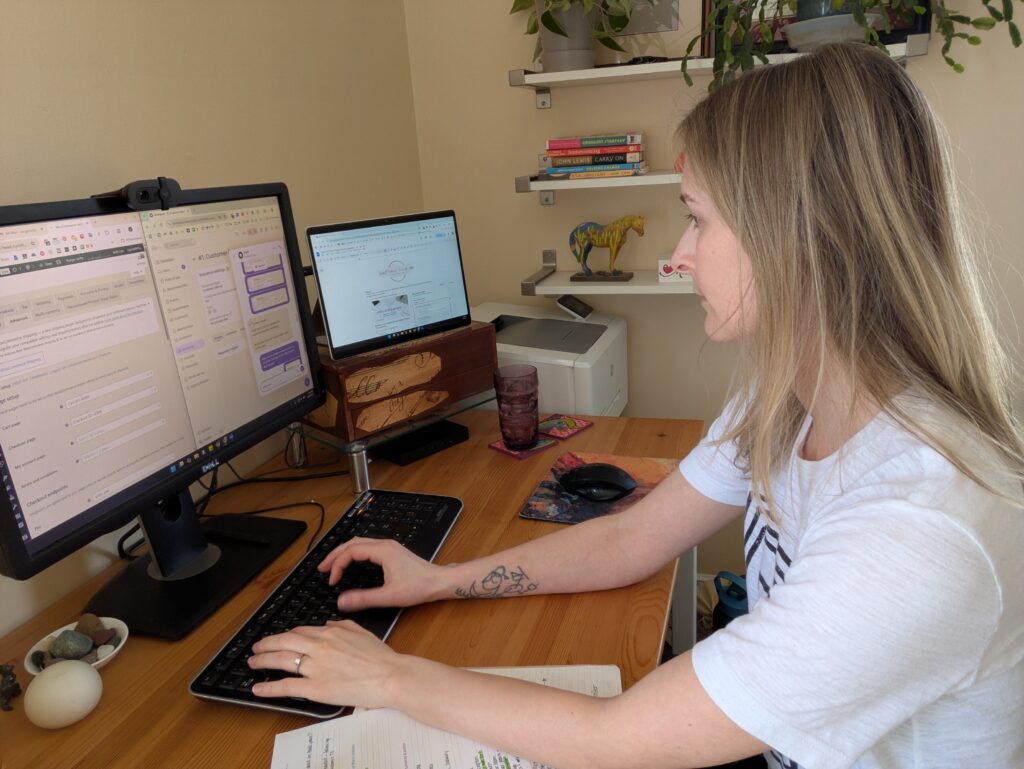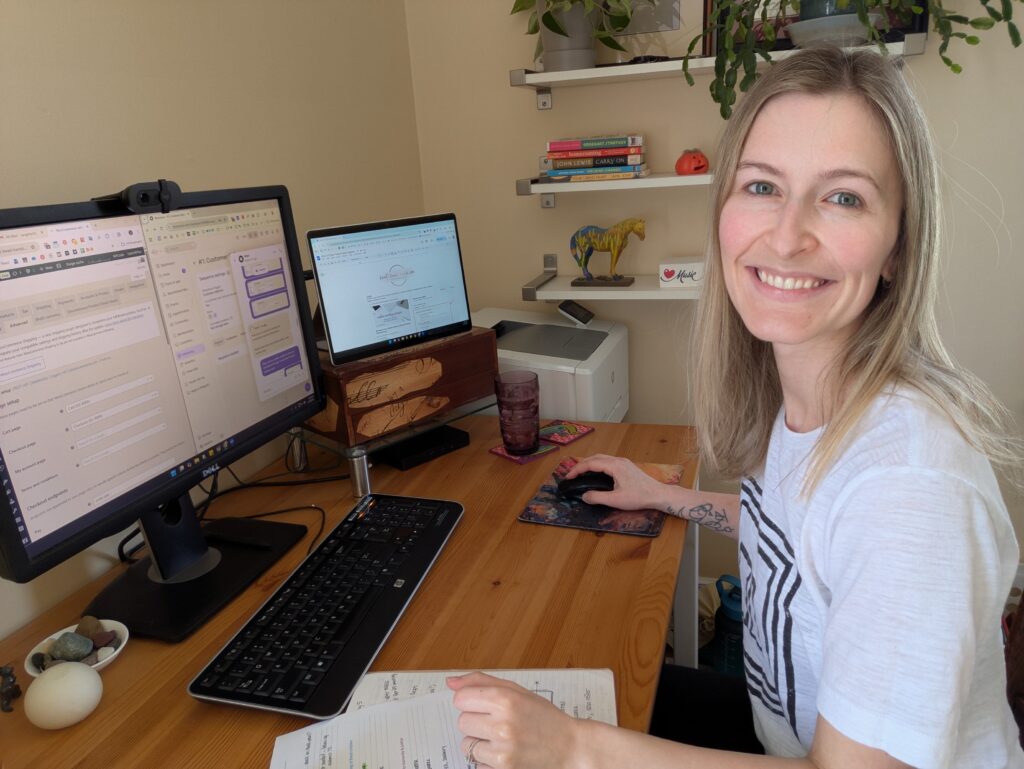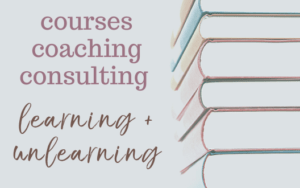I am excited to introduce Sarah Gettel, a good friend and accountability partner who’s been working behind the scenes with Heart-Head-Hands: Everyday Living for Justice.
Sarah and I met in 2019, soon after I’d left my faculty career, through mutual contacts engaged in racial justice organizing in Madison and Milwaukee, Wisconsin. We deepened our relationship in the early days of the pandemic, forming an accountability pod and meeting regularly with Rasha Diab and Mel Meder. Then, Sarah began consulting with me to repair broken web pages and WordPress plugins, technical troubleshooting that grew into website support and, from there, into broader operations support and teaching and mentoring. I now think of Sarah as my “capacity coach,” as she advises me across business questions, from communications to workflow and priority-setting.
In the past year, Sarah has been willing to dive in deeply to learn the registration system, Momence, that I use for running writing groups, retreats, and other offerings. As Sarah becomes more involved, it’s likely you’ll hear from her. She’s beginning to send emails and is available to support with account questions. We want to be sure you know Sarah, so we hope you’ll read her interview, and reach out to say “hi!”

Q&A with Sarah Gettel
1. Tell us about yourself and your work in the world.
Through my consulting practice, Capacity for Changemakers, I help social justice nonprofits and small businesses build capacity by securing funding, developing compelling content, and establishing systems that support their long-term success. I work remotely from Saint Paul, MN, on Dakota land, where I live with my partner Alex and our beloved animals.
My path into this work started in a predominantly white suburb of Milwaukee, where I developed early passions for animal welfare and women’s rights. In college, I was an avid volunteer, and a transformative course on Black literature deepened my understanding of history and spurred my commitment to racial justice work. I moved to Washington, DC, where I worked as a grant writer for anti-human trafficking organizations. It was a time of intense learning, and I gained valuable, hands-on experience in institutional fundraising.
Global community responses to trafficking inspired me to think more deeply about how we uproot racism locally. In response to events like the murder of Freddie Gray, the rise of Black Lives Matter, and the 2016 election, I pursued a Master of Social Work at the University of Michigan, focusing on community organizing and Afrocentric practice. During that time, I became deeply involved in supporting Black liberation organizing behind the scenes and in engaging white people in allyship and accountability practice. I continued this work for six years—organizing, writing, fundraising, and learning alongside movement leaders. The experience sharpened my understanding of how communications, fundraising, operations, and capacity-building skills could support long-term social justice work.
2. What have you been doing behind-the-scenes with Heart-Head-Hands: Everyday Living for Justice?
I help manage both the Heart-Head-Hands website and our customer relationship management (CRM) system, Momence. This platform supports key functions like booking writing retreats and workshops, managing paid membership subscriptions, and sending newsletters. I help to build infrastructure and develop communications protocols within the platform to ensure we’re collecting accurate data and using it to create a personalized, supportive user experience. I regularly troubleshoot issues, interface with the Momence support team, and advocate for new features to enhance functionality.
Most recently, we set up a new referral program to encourage more people to spread the word and welcome friends and colleagues to the Heart-Head-Hands community. We also made a few adjustments to the website to make it more streamlined and user-friendly.

3. How might people interact with or hear from you in the future?
I love participating in Heart-Head-Hands writing retreats, so there’s a chance we’ll cross paths in one!
If you ever run into issues with the Heart-Head-Hands website or Momence, Beth might loop me in to help troubleshoot. You may also receive a few emails from me, such as reminders about upcoming writing retreats.
Feel free to reach out any time if you’d like to connect via email or LinkedIn. I always welcome opportunities to connect and explore ways we might collaborate.4. How are you living out your commitment to justice now, in this season of life?
There’s an overwhelming amount of need in the world right now, and I’m continually assessing where to focus my energy and how to both push myself and pace myself. One resource that helped ground me recently was this guide that Kate Barrow put together, which highlights the wisdom of some amazing organizers around taking action, resisting, building community and finding your people, fortifying for the long haul, and navigating difficult moments.
I deeply believe that connecting with our neighbors and broader community is how we draw closer to one another and how we move toward justice and peace. Community organizing is one of the key ways I show up for justice. I’m active through local work with Showing Up for Racial Justice (SURJ) Twin Cities. I also serve on the board of Bay Bridge Wisconsin, which allows me to continue contributing to organizing work in a community I used to call home.
I remain committed to ongoing learning, especially around local history, reparations work in Saint Paul, and resisting fascism.
I’m grateful for my pod accountability relationships, including with Beth, which sustain and ground me.Through Capacity for Changemakers, I partner with clients who are also committed to social justice. Sometimes, when values aren’t aligned—or that misalignment becomes clear over time—it means saying no or stepping away from an engagement. That discernment is part of the work.
I used to roll straight out of bed and dive into work, often working late. I was always “on,” always available. My work had become deeply entangled with my sense of identity and self-worth. But that wasn’t sustainable or true. A vital part of my commitment to justice now includes resisting the capitalist pressure to constantly produce, achieve, or equate my value with my productivity (while extending that perspective to others).
In this season, I’m learning what it looks like to support myself in my work while living with chronic illness, family planning, and aligning with my neurodivergence. It sometimes means moving at a slower pace, not chasing every opportunity, trusting in enoughness and abundance, and shaping my business so that it supports rather than drains me.

—
This interview is conducted by Beth Godbee, Ph.D. with Sarah Gettel, Consultant, Operations Support, and Capacity Coach for Heart-Head-Hands.com. Learn more about Sarah and, if you’re interested in working together, reach out to her here.



Leave a Reply